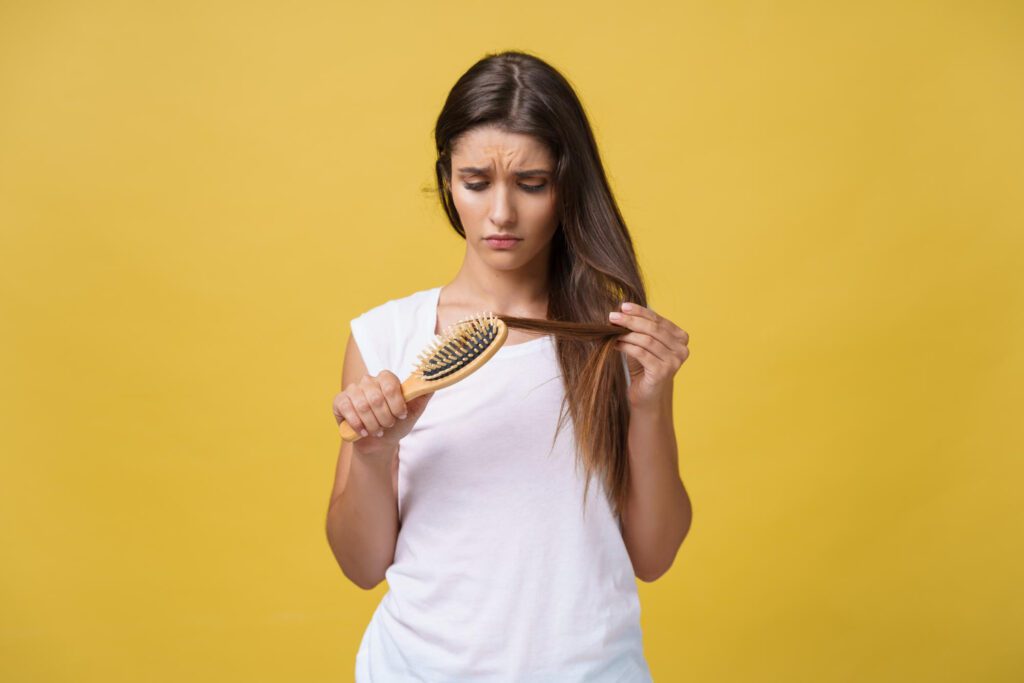
Can Diabetes Cause Hair Loss: Surprising Connections Revealed!
admin
- 0
- 8
Yes, diabetes can cause hair loss. It is a known side effect of the condition due to factors like poor circulation and hormonal imbalances.
Hair loss is a common concern for people with diabetes, and it can affect both men and women. Diabetes can lead to poor circulation in the scalp, which can impact hair growth. Additionally, fluctuations in hormone levels that occur with diabetes can also contribute to hair loss.
Managing blood sugar levels and maintaining a healthy lifestyle can help minimize the risk of hair loss associated with diabetes. It is important for individuals with diabetes who experience hair loss to consult with a healthcare professional to determine the underlying causes and explore potential treatment options.

Table of Contents
ToggleUnderstanding The Relationship Between Diabetes And Hair Loss
With the growing number of people diagnosed with diabetes, it’s important to understand the various ways this condition can affect the body. Surprisingly, one of the lesser-known effects of diabetes is hair loss. While it may not be a well-known symptom, the relationship between diabetes and hair loss is significant.
Let’s delve deeper into this connection and explore the impact that diabetes can have on hair growth.
Unveiling The Surprising Link Between Diabetes And Hair Loss
Diabetes is a complex condition that can lead to a range of complications throughout the body. One such complication is hair loss. Here’s what you need to know about how diabetes can affect the growth of your hair:
How Does Diabetes Impact Hair Growth?
- High blood sugar levels: In diabetes, the body either fails to produce insulin or doesn’t use it effectively. This leads to elevated blood sugar levels, which can disrupt the normal functioning of hair follicles. When the glucose levels are consistently high, it can weaken and damage the hair, disrupting its growth cycle.
- Reduced blood flow: Diabetes can adversely affect blood circulation, leading to reduced blood flow to the scalp. Since hair follicles rely on a steady supply of oxygen and nutrients from the blood, impaired circulation can result in weakened hair follicles and ultimately hair loss.
- Inflammation and immune system dysfunction: Diabetes can cause chronic inflammation and compromise the immune system’s ability to function properly. Hair loss can occur as a result of inflammation-induced damage to the hair follicles, leading to the interruption of the hair growth cycle.
The Role Of Insulin Resistance In Hair Loss
- Insulin resistance: Insulin resistance is a core characteristic of type 2 diabetes. When the body becomes resistant to the effects of insulin, it struggles to maintain normal blood sugar levels. Insulin resistance can disrupt the delicate balance of hormones involved in hair growth, leading to excessive shedding and hair thinning.
- Androgenic alopecia: Insulin resistance can also contribute to a condition known as androgenic alopecia, which is commonly associated with male or female pattern baldness. Hormonal imbalances resulting from insulin resistance can trigger the miniaturization of hair follicles, causing hair to become thinner and fall out over time.
Understanding the relationship between diabetes and hair loss is essential for individuals living with diabetes. By managing blood sugar levels effectively and adopting a healthy lifestyle, it may be possible to minimize the impact of diabetes on hair growth. If you’re experiencing hair loss alongside diabetes, consulting a healthcare professional can provide valuable guidance on managing both conditions effectively.
Remember, proper diabetes management is key to maintaining overall well-being, including the health of your hair.
Identifying The Different Types Of Hair Loss Associated With Diabetes
Living with diabetes can bring about various challenges, and one lesser-known side effect is hair loss. Many individuals with diabetes may experience changes in their hair, which can be distressing and worrisome. In this section, we will explore the different types of hair loss associated with diabetes and shed light on their connections.
Let’s dive into the details and understand how diabetes can impact our hair health.
Exploring Telogen Effluvium: A Common Hair Loss Condition In Diabetic Patients
- Telogen effluvium is a type of hair loss characterized by excessive shedding or thinning of hair.
- This condition occurs when a higher number of hair follicles than usual enter the resting phase simultaneously.
- For individuals with diabetes, the fluctuations in blood sugar levels and the body’s response to insulin can trigger telogen effluvium.
- Stress, which is common among people with diabetes, can also contribute to this condition.
- The good news is that once the underlying issues are addressed and blood sugar levels stabilize, hair typically grows back.
Understanding Alopecia Areata And Its Connection To Diabetes
- Alopecia areata is an autoimmune condition that causes hair loss in distinct patches.
- While the exact cause remains unknown, studies have suggested a link between diabetes and alopecia areata.
- It is hypothesized that an autoimmune response triggering diabetes could also lead to the development of alopecia areata.
- Similarly, stressful events like managing diabetes can act as triggers for this condition.
- Treatment options for alopecia areata include medications, corticosteroid injections, and topical treatments.
Examining Androgenetic Alopecia: Is There A Link To Diabetes?
- Androgenetic alopecia, commonly known as male or female pattern baldness, is characterized by a gradual reduction in hair volume and thickness over time.
- Studies have shown a potential correlation between androgenetic alopecia and metabolic disorders such as diabetes.
- Hormonal imbalances and genetic predisposition contribute to the development of androgenetic alopecia.
- Diabetes, with its impact on hormone regulation and metabolic processes, may play a role in the progression of this condition.
- Treatment options for androgenetic alopecia include medications like minoxidil, hair transplants, and laser therapy.
Understanding the different types of hair loss associated with diabetes can help individuals effectively manage any changes they may experience. If you notice hair loss or changes in hair growth patterns, it is crucial to consult with a healthcare professional to determine the underlying cause and develop a comprehensive treatment plan.
Uncovering The Mechanisms Behind Diabetes-Induced Hair Loss
Hair loss can be a distressing symptom for anyone, and for individuals with diabetes, this concern can be amplified. But can diabetes really cause hair loss? Let’s delve deeper into the mechanisms behind diabetes-induced hair loss to uncover the reasons behind this phenomenon.
Inflammation And Hair Loss: The Inflammatory Pathways In Diabetes
- Inflammation plays a pivotal role in the development and progression of diabetes-related hair loss.
- Chronic inflammation in the scalp can disrupt the hair growth cycle, leading to excessive hair shedding.
- Increased levels of pro-inflammatory cytokines, such as tumor necrosis factor-alpha (tnf-alpha) and interleukin-6 (il-6), have been linked to hair loss in diabetes.
- Elevated levels of these inflammatory markers can trigger an autoimmune response that targets hair follicles, leading to their miniaturization and eventual hair loss.
The Role Of Hormonal Imbalances In Diabetes-Related Hair Loss
- Hormonal imbalances are frequently observed in individuals with diabetes, which can contribute to hair loss.
- Insulin resistance, a hallmark of diabetes, can lead to an overproduction of androgens, such as testosterone.
- Excessive androgens can induce a condition called androgenetic alopecia, which is the most common form of hair loss in both men and women.
- Additionally, imbalances in other hormones, such as thyroid hormones, can also contribute to hair loss in individuals with diabetes.
Blood Circulation And Nutrient Deficiency: How They Contribute To Hair Loss In Diabetic Individuals
- Diabetes can impair blood circulation, including the microcirculation in the scalp, leading to inadequate nutrient supply to hair follicles.
- Reduced blood flow and oxygenation to the hair follicles can weaken their structure and impede hair growth.
- Diabetes-related nutrient deficiencies, particularly deficiencies in vitamins and minerals essential for hair health, can further exacerbate hair loss.
- The compromised nutrient absorption in diabetes, along with restricted dietary choices, can contribute to these deficiencies.
Understanding the underlying mechanisms behind diabetes-induced hair loss is crucial in addressing this concern. By managing inflammation, hormonal imbalances, and ensuring adequate blood circulation and nutrient supply, it is possible to minimize the impact of hair loss in individuals with diabetes.
Seeking assistance from healthcare professionals and adopting a comprehensive approach can help optimize hair health and enhance overall well-being.
Managing Diabetes And Preventing Hair Loss
Controlling Blood Sugar Levels: The Key To Reducing Hair Loss In Diabetics
Managing diabetes is crucial for preventing hair loss in individuals with diabetes. When blood sugar levels are not properly controlled, it can lead to various complications, including hair loss. Here are key points to consider in controlling blood sugar levels:
- Consistently monitor your blood sugar levels to ensure they remain within the target range set by your healthcare provider.
- Take prescribed medications as directed by your doctor and adjust them if necessary.
- Adopt a healthy lifestyle that includes a balanced diet, regular exercise, and adequate sleep.
- Limit the consumption of sugary foods and drinks that can cause a spike in blood sugar levels.
- Stay hydrated by drinking plenty of water throughout the day.
- Consider incorporating low-glycemic index foods, such as whole grains, lean proteins, and fruits and vegetables, into your diet.
- Avoid skipping meals and try to eat smaller, more frequent meals to maintain steady blood sugar levels.
- Incorporate stress management techniques, such as meditation or deep breathing exercises, to help regulate blood sugar levels.
By controlling blood sugar levels effectively, you can reduce the risk of complications associated with diabetes, including hair loss.
Implementing A Balanced Diet And Regular Exercise Routine For Optimal Hair Health
Maintaining a balanced diet and engaging in regular exercise can greatly contribute to optimal hair health for individuals with diabetes. Here are key points to consider when implementing these lifestyle changes:
- Consume a diet rich in essential nutrients, including vitamins a, c, d, and e, as well as biotin, iron, and omega-3 fatty acids, which are beneficial for hair health.
- Include foods such as fish, nuts, seeds, whole grains, fruits, and vegetables in your diet to provide the necessary nutrients for hair growth.
- Avoid crash diets or extreme restrictions, as they can lead to nutrient deficiencies that may adversely affect hair health.
- Engage in regular exercise to improve blood circulation and promote overall wellness.
- Choose activities that you enjoy and are suitable for your fitness level, such as walking, swimming, or cycling.
- Aim for at least 30 minutes of moderate-intensity exercise most days of the week.
- Consult with your healthcare provider before beginning any new exercise routine to ensure it is safe for you.
- Stay consistent with a balanced diet and regular exercise to optimize hair health and overall well-being.
The Importance Of Stress Management In Mitigating Diabetes-Induced Hair Loss
Stress can exacerbate the effects of diabetes and contribute to hair loss in individuals with the condition. Therefore, implementing effective stress management techniques is essential. Consider the following key points when managing stress:
- Identify the sources of stress in your life and explore ways to reduce or eliminate them.
- Engage in activities that help you relax and unwind, such as yoga, meditation, or hobbies you enjoy.
- Prioritize self-care by getting enough sleep, practicing good hygiene, and taking breaks when needed.
- Seek support from loved ones, join support groups, or consider therapy to manage stress effectively.
- Manage your time wisely and establish a balanced schedule that allows for both work and leisure activities.
- Practice deep breathing exercises or use relaxation techniques to reduce stress levels.
- Avoid excessive caffeine and alcohol consumption, as they can exacerbate stress symptoms.
- Remember to be patient with yourself and acknowledge that stress management is an ongoing process.
By prioritizing stress management and adopting healthy coping strategies, you can minimize the impact of stress on your diabetes and hair loss.
Exploring Treatment Options For Diabetes-Related Hair Loss
Hair loss can be a distressing side effect of diabetes, leaving many patients wondering if there are any solutions to combat this issue. Fortunately, there are several treatment options available that can help promote hair regrowth in diabetic individuals. In this section, we will explore some of the most effective treatments for diabetes-induced hair loss.
From medications and topical treatments to hair transplantation and alternative therapies, let’s delve into the possibilities and find the best approach for combating hair loss in diabetics.
Medications And Topical Treatments For Hair Regrowth In Diabetic Patients:
- Finasteride: This medication is often prescribed to address male-pattern baldness by reducing the level of dht, a hormone responsible for hair loss. Studies have shown that finasteride can also be effective in diabetic individuals experiencing hair loss.
- Minoxidil: As a topical solution, minoxidil is known for its ability to stimulate hair growth. It increases blood flow to hair follicles, which can be particularly helpful for diabetic patients who may have compromised circulation.
- Corticosteroids: In some cases, corticosteroids can be used to reduce inflammation and suppress the immune response that may contribute to hair loss in diabetics.
Hair Transplantation: A Viable Solution For Diabetes-Induced Hair Loss:
- Follicular unit transplantation (fut): Also known as strip harvesting, fut involves removing a strip of scalp from the back of the head and transplanting it to the areas experiencing hair loss. This procedure can provide long-lasting results for diabetic individuals.
- Follicular unit extraction (fue): Fue is a minimally invasive hair transplantation technique that involves extracting individual hair follicles from a donor area and implanting them in the areas where hair is thinning or lost. It offers a natural-looking hairline and minimal scarring.
Integrative Approaches: How Alternative Therapies Can Help Combat Hair Loss In Diabetics:
- Scalp massage: Regular scalp massage can improve blood circulation to hair follicles, promoting hair regrowth. Taking a few minutes each day to gently massage your scalp can be beneficial for diabetic individuals concerned about hair loss.
- Aromatherapy: Certain essential oils, such as lavender, rosemary, and cedarwood, have been associated with hair growth stimulation. Dilute these oils in a carrier oil and massage into the scalp for potential benefits.
- Nutritional supplements: Nutrient deficiencies can contribute to hair loss. Diabetic individuals may consider adding supplements like biotin, iron, and zinc to their diet after consulting with a healthcare professional.
Remember, everyone’s response to treatments may vary, and it’s important to consult with a healthcare professional before starting any new treatments. By exploring medication options, considering hair transplantation, and integrating alternative therapies, individuals with diabetes-related hair loss can have hope of regaining their confidence and achieving healthier hair.
Frequently Asked Questions For Can Diabetes Cause Hair Loss
Can Diabetes Cause Hair Loss In Men And Women?
Yes, diabetes can cause hair loss in both men and women. High blood sugar levels can damage blood vessels and affect circulation, depriving hair follicles of essential nutrients. Additionally, hormonal imbalances associated with diabetes can disrupt the hair growth cycle, leading to hair loss.
Why Does Diabetes Cause Hair To Fall Out?
Hair loss in diabetes can occur due to various factors. One main reason is poor blood circulation caused by damaged blood vessels, which deprives hair follicles of necessary nutrients. Additionally, hormonal imbalances and medications used to manage diabetes can disrupt the hair growth cycle, resulting in hair loss.
Is Hair Loss Reversible In Diabetes?
Hair loss caused by diabetes can be reversible in some cases. By managing blood sugar levels effectively, maintaining a healthy lifestyle, and addressing any underlying nutritional deficiencies, individuals with diabetes may see improvement in hair growth. Consulting with a healthcare professional is recommended for personalized guidance and treatment options.
Does Hair Loss Indicate Diabetes?
While hair loss can be a symptom of various health conditions, it is not a definitive indicator of diabetes. Hair loss can result from several factors, such as genetics, stress, hormonal imbalances, or nutritional deficiencies. If experiencing hair loss, it is important to consult with a healthcare professional to determine the underlying cause.
Conclusion
It is evident that diabetes can contribute to hair loss due to various factors related to the disease. The high blood sugar levels and insulin resistance associated with diabetes can affect the hair growth cycle, leading to thinning and shedding.
Additionally, hormonal imbalances, nutritional deficiencies, and vascular complications can further exacerbate hair loss in individuals with diabetes. To address this issue, managing diabetes through proper blood sugar control and a healthy lifestyle is crucial. Regular exercise, a balanced diet, and medications as prescribed by healthcare professionals can help stabilize blood sugar levels and minimize the risk of hair loss.
Adequate consumption of essential nutrients, such as vitamins and minerals, can also promote hair health. Seeking professional advice from healthcare providers or dermatologists can provide personalized guidance on managing diabetes-related hair loss. Remember, early detection and management of hair loss can significantly improve outcomes and enhance the overall quality of life for individuals living with diabetes.



